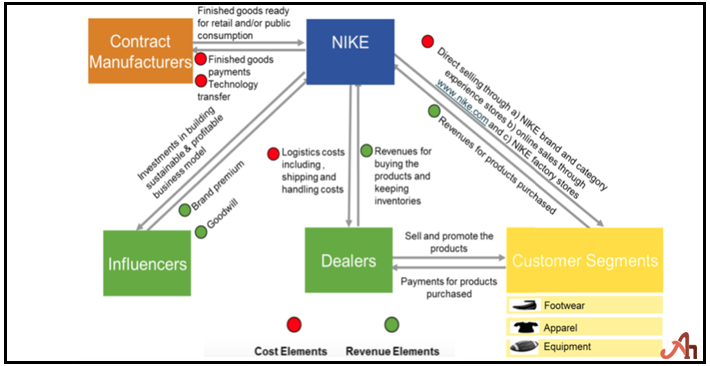

Nike as a company came into existence only in the 1960s, when a Stanford college business graduate, Philip Knight, 1962, started a firm to overshoot the German monopoly in American markets. His attempt was seen as a move to propel American nationalism to have self-supremacy and contingency, at least in sports market equipment (since it is directly related to national pride). Phil Knight made a bold move to not get involved in the manufacturing process and be an importer. This way, he claimed increased employment in Japan, and Latin America by introducing angel investors who funded this project. But disregarding such proxy control, Nike Corporation is still heavily involved in design, marketing, price regulation, and market expansion. Thus, all big decisions are still Nike’s decisions that endorse great athletes and have a much wider ideology of finding the athlete within you which is a strategy that resonates very heavily with the middle class. The biggest Nike market that has been captured is the USA, as the knight originally intended. Other than that, Nike’s world-class promotional marketing strategy and state-of-the-art advertisements have left sports handprints on the first, second, and third worlds, if not alike. Nike sales boomed in the late 1970s with the issue of jogger shoes. Since then, the Nike market also expanded to Asia in 1982 when India hosted the Asian Games.

Let us say Nike wants to capture a first-world market like Australia. First, Nike will do a SWOT analysis to check the environmental conditions. SWOT can include the per capita income of Australia, the average life span of people, government laws to set up factories, CSR (corporate social responsibility), bank rates, relations and sanctions with other countries, obesity levels, family values held by Australians, etc. after doing this, it has been consciously taken care of that Nike might have to sell below market price initially to make a profit. This is a very common strategy that relies on the deep pockets of companies that can take a bad season only to capture the market and get a steady rise in price after that. First, they have to make a place in people’s hearts for footwear because if this market goes, then all the other plans for subsequent products might never see the light of day.

Business strategy involves opening showrooms in metros of that particular country attracting aristocrats of the city first. Since they form a higher social design of emulation demographic. Also, it involves signing up all the top athletes in the country and shooting very expensive ad campaigns. It also involves collaborating with local famous YouTube channels, and television shows, funding movies, and whatnot.
Initially, Nike started out selling footwear only but slowly started to make its mark in the clothing industry too. Nike has been a leading importer of soccer studs. Then they did a whole commercial saga with Michael Jordan in the 1980’s to launch Air Jordan basketball shoes. Then their alignment with top racquet stars like Roger Federer, Rafael Nadal, Serena Williams, Pete Sampras, and all the greats of their generation. Nike is also heavily involved in badminton by collaborating with the best Chinese and Malaysian players. Even further, they are endorsing swimming, and cycling greats (like Lance Armstrong), table tennis, and any other known sport worldwide. The eagle has an eye for research and development, i.e. they like to keep improving no matter what. They invest heavily in test labs and are very self-critical, which makes them world leaders. Also, they watch fashion trends closely and look out for what makes the young demographic (16–35 years old) feel good about them.
Nike was founded in the 1960s by Philip Knight, a Stanford college business graduate, in 1962. His aim was to challenge the German monopoly in American markets and promote American nationalism, especially in sports equipment.
Nike has collaborated with top athletes like Michael Jordan, Roger Federer, Rafael Nadal, Serena Williams, and others. It has also partnered with celebrities, influencers, and media channels to create impactful advertising campaigns that resonate with consumers worldwide.
For more information about Nike’s heritage, pricing strategies, and business practices, you can visit their official website or explore reputable business and industry publications for in-depth analysis and insights.